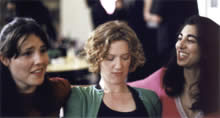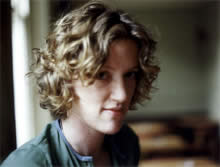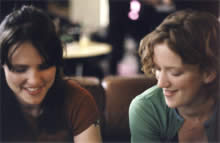Next we strolled four abreast to the Electricity Showroom, a canteen of style fed upon by the East's children of the apocalypse - there seems to be a mess everywhere, always. The Muses flopped about in fits of laughter while Prudence touted her ragged wares to all who cared to look. Then we moved on for food, I invited them home for a Carbonara but they insisted on The Real Greek - top food but a little slow and dear in my mind - I'm out voted here anyway. On the way I'm led by the arm into a doorway, a buzzer is pressed and a smart lady with a look in her eye opens the door. I feel like the lonely boy next door, "Is it OK if we bring a friend?" they ask. Errrm….
I'm now milling around a quite wonderful little boutique that sells many, many plastic penises and other such things to play with. Naughty books, naughty videos, naughty presents for Grandma - all very naughty but not like the Soho sleaze pits, I'd take a date here for coffee.
The Real Greek wasn't too busy and despite having an absolutely wonderful time my Muses kept hinting that, perhaps I'd better finish the interview. Good idea. If you manage to pick up a copy of Screen International this week, turn to the international production, page 18, and read the first story. Can't be creative now - eating.

What's the Little Ashes story?
Went that we entered a competition and had to put in a few ideas, I did an outline for Little Ashes. It won the competition, it got script edited and then I had to write it, I thought 'Oh OK'. That draft got funding from a big EU organisation called Media II, they are quite picky when it comes to selecting. I think three UK companies got money last year, we were one of them and the other two were really well established - they normally go on track record so it was real coup for us.
 How much did they give you?
How much did they give you?
MC: It was about 10,000 Euros, £6k and I think we should have applied for more because we would have got it.
PB: It was perfect at the time and it's really kept the project going and now Philippa's been selected for the Moonstone lab.
PG: Last year it was in Ireland and this year it's in Italy - it's a tough life!
PB: We've basically been developing Little Ashes and Paradise Lost, the project we were originally set up to develop.
What happened then?
PB: Before we went to Cannes first time round we rang a lot of European production companies to set up meetings. Interestingly, the first company we met was Egmond who had produced Antonia's Line and developed The Luzhin Defense. We had a one page outline for Little Ashes that they were really pleased with but it was almost a year later when we finally called them to say we had a script for it. They were again very interested and were interested in a co-production just like that."
Moira pipes up now and all of a sudden I can see how things have happened for the Muses, "Then they gave us Marleen Gorris - we'd heard before that she didn't want it but she'd not even see the script - anyway we went over to meet her after that. She was just fantastic and we shared the same passion for it - it's very nice when that happens.
PG (below): since then I've gone through and re-written the screenplay with her.

What's happening with that now?
MC: Basically are putting in 50% and we have to get the other 50% but we've already on board through Defries' Main Man company. So we now need another 40% and we want to start shooting in September/October - that's fairly near.
PB: So at the moment we are going hell for leather trying to attach cast, talking to sales agents and executive producers but Cannes will be a blitz to get the other 40%.
PG: We can't use American money or actors because of the strike so we'll have to find a British cast and talk to the European producers.
Tell me about the film.
PG: Its set in Spain in the 1920's and its essentially about the love affair between a very young Dali and the great Spanish poet Garcia Lorca. Because Dali was only 18 at the time he is in no way the man he became in later life, none of the moustaches although there is at the end of the film. He started off as a student totally paralysed with nerves, he couldn't even speak to people he was so shy and he desperately wanted to become part of this erudite set that Bunuel and Lorca were involved in. It's about his gradual transformation into this caricature that he created for himself.

Who was Carlos Lorca?
PG: He was a playwright and a poet who's very well known in Europe but not so well known over here. His assassination was ordered at the outbreak of the Spanish civil war by Franco, partly for being too forthright in his political opinions but also for being a homosexual. It's about a love affair between too men in a society where that was still taboo, there's very little of the actual war in the film.
Is Bunuel featured much?
PG: Not too much because Bunuel moves to Paris half way through the story, he became very jealous of their relationship.
PB: The element of the story that really works is young people and their sexual confusion, it transcends the fact that they become famous figures but the fact who they are becomes a really interesting way in.
MC: It's about choices in life, either going with who you are or choosing to become someone else to achieve your goals in a much more public sense.

How's it work with the three of you when one is writing?
PG: One writes and the other two script edit and it's such an involved process that it gets to the point that none of us can be objective anymore. We've been lucky in that we've had script editing through Euroscript, the editor that worked on that liked the project so much that she was still interested by the time we'd finished the first draft. Now we've got Marleen giving her input and we'll have seven other writers giving their opinion on it through Moonstone.
What mistakes have you made that you wouldn't want someone else to make?
PB: Don't send a screenplay out until it's at its strongest stage. I think another common mistake people make is to tire the contacts they make, or they approach people the wrong way - they think they have to pitch to everyone all the time. I think that when making contacts you need to be as natural as possible, not harassing them with phone calls.
MC: You can't be afraid if you want to start on your own, you need to be confident in yourself and in your talents.
Wanton Muse can be contacted at www.wantonmuse.com